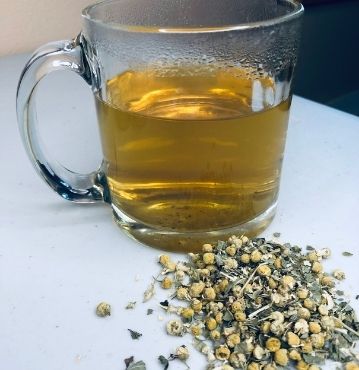Chamomile is old-school medicine. The earliest recorded use of Chamomile for medicinal purposes dates back to 1550 BCE and is mentioned in  the Egyptian record of herbal medicine. The Egyptians dedicated the fragrant herb of Chamomile to the sun god Ra and used it in various rituals and remedies. Chamomile was brewed into tea and infused into oils and ointments for its soothing effects on the skin and digestive system. Today, Chamomile grows along the banks of the sacred Nile River in Menia, Fayoum, Benisuef and Assuit areas of Egypt.
the Egyptian record of herbal medicine. The Egyptians dedicated the fragrant herb of Chamomile to the sun god Ra and used it in various rituals and remedies. Chamomile was brewed into tea and infused into oils and ointments for its soothing effects on the skin and digestive system. Today, Chamomile grows along the banks of the sacred Nile River in Menia, Fayoum, Benisuef and Assuit areas of Egypt.
Chamomile importance continued to spread through the Mediterranean region, becoming popular among the Greeks and Romans. These ancient cultures valued Chamomile for its calming properties and often used it as a digestive aid and sleep aid. The name “chamomile” is believed to have Greek origins, meaning “earth-apple,” referring to its apple-like scent.
A Relaxing Honey-Sweet Infusion
Research suggests that Chamomile may improve the glycemic and lipid profiles and oxidative stress levels associated with Diabetes Mellitus. Chamomile contains chemicals called flavonoids. Flavonoids also possess antibacterial, antiviral, and anti-inflammatory effects. Clinical studies reveal that flavonoids may protect against various conditions, including cardiovascular disease and cancer.
Chamomile Tea Good For
- Menstrual symptoms
- Anxiety relief
- Sleep and relaxation
- Cold symptoms
- Reduces mild skin conditions
- Gastrointestinal health
- Used as a vaporizer
Avoid
Limit the use of Chamomile while breastfeeding or pregnant. Chamomile can cause contractions in the uterus. Furthermore, avoid it if you are allergic to daisies, ragwort, marigolds, or chrysanthemums or are taking blood-thinning drugs.
Passion Flower
Native Americans and the Aztecs of Mexico used Passion Flower as a sedative. names for passionflower is generally used today to alleviate anxiety and insomnia, received its curious name from the Spanish conquistadors in Mexico and Peru in the sixteenth century.
Early herbalists used the plant as a remedy for a number of maladies, including epilepsy, insomnia, whooping cough, anxiety, depression, menstrual cramps, and diarrhea. Today, herbal medicine practitioners continue to use passionflower as a mild tranquilizer, pain reliever and digestive aid, although there appears to be no solid scientific proof of its effectiveness.
Spearmint
Spearmint is a Mediterranean native known from ancient times as an herb of hospitality. In the symbolism of plants, spearmint conveys wisdom.
Like most medicinal herbs, the mints have found a place in ancient history. The generic name Mentha is derived from the story of the goddess Perse-phone, who was jealous of Pluto’s love for the nymph Minthe, and transformed her rival into a common garden plant. The god Pluto, unable to retrieve the lovely Minthe, assured that her fragrance would waft on the garden breezes, releasing more of the pleasant aroma each time it was trod upon.
Spearmint is particularly beneficial in relieving digestive disorders, colic, and flatulence due to their carminative and antispasmodic actions, and may be helpful in the treatment of irritable bowel syndrome. Spearmint also relieves motion sickness, hiccups, and nausea.


